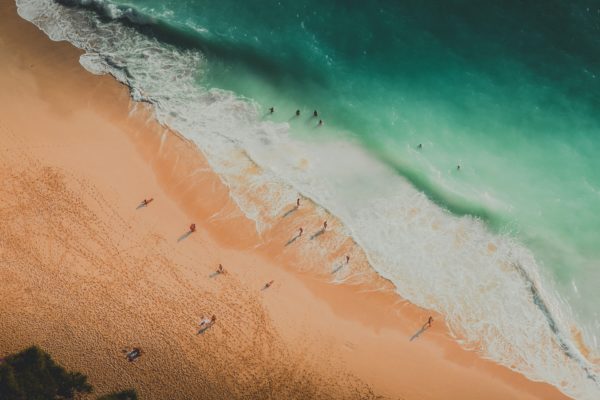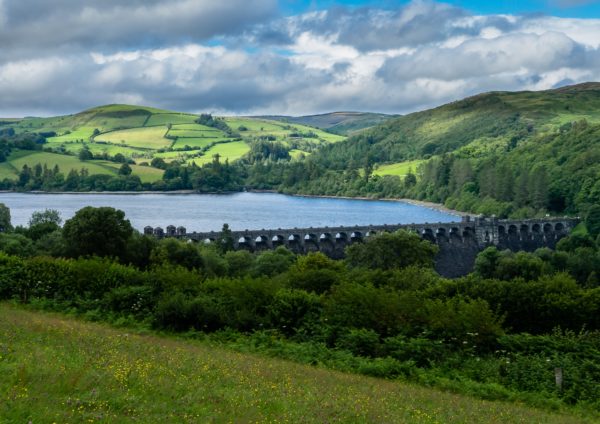“When I started looking at water I was boggled and continue to be by absolutely how extraordinary it is; it’s a marvel,” says Luci Attala, author of How Water Makes us Human: Engagements with the Materiality of Water (University of Wales Press, 2019).
Water, essential for all life and ubiquitous, is also mysterious and weird when it comes to its physical properties. It is most dense when at 4 degrees Celsius, not in its solid, frozen state. While a life-giving solvent of minerals, it is not a universal solvent, meaning the cells in our bodies can retain it, rather than be dissolved by it. Phillip Ball, author of H2O A Biography of Water, has described water as unlike any other liquid, defying all the rules.
For Attala, a senior lecturer in anthropology at the University of Wales Trinity Saint David, it wasn’t just water’s unique physical properties that compelled her to set to work on How Water Makes us Human; she wanted to re-enchant the world with water.
“The human exceptionalist focus that has dominated imaginations, the assumption that we are in charge and make decisions about what happens on earth, is patently a fallacy. We need to reimagine our relationship with water.”
Look at the extreme weather experienced across countries north of the equator in 2020, she says, for the stark reality that all of us, no matter where, are far from in control when it comes to water.
Experiencing water
A near-death experience with her child in the sea off the coast of the Indonesian island of Bali was the phenomenal shock that forced Attala into a new way of thinking about water; it changed the way she could think about it.
“I spent most of my childhood under the water really, because I love it; it’s one of the best places to be; everything shuts up when you’re under there.
“That day in the sea it felt like the water had turned on me. We swam out and the character of the water suddenly changed. From a soft undulating body, the water started slapping and chopping. When we tried to swim back, we were pulled and sucked under.”
Attala and her child quickly realised they were unable to swim back and were rescued by locals who understand how the water moves in that area. They explained that the volume of shipping containers that pass through the relatively thin channel – past the island and out into the Indian Ocean – can cause turbulence in the water. Attala realised how consumer choices in Europe were impacting the water where she was in Asia.

“It’s not as simplistic as cause and effect. Everything we do has an effect on the world in ways that we can’t easily comprehend,” says Luci. “The plastic, the landfill we buy, it’s doing all sorts of things we’re just not aware of. I always knew that intellectually, but this was a physical knowing, it was embodied. The distant keyboard clicks of consumption causing this body of water to become dangerous.”
“water shapes the internal architecture of everything – both what is alive and what appears to be inert, such as the landscape.”
Re-enchanting water
Intrigued by how water moves and is moved, Attala saw water with new eyes, and soon realised how, “water shapes the internal architecture of everything – both what is alive and what appears to be inert, such as the landscape.”
“We want to contain water, we force it through pipes, but this isn’t how water moves naturally, it spirals. I realised that what we don’t have is a caring, loving relationship with water,” she explains.
“If you have a loving relationship with someone or something, you’re not looking to use it, to profit from that relationship. Love urges you towards knowing something more deeply, and there’s a pleasure from allowing them to flourish. This is beyond the physical, beyond seeing something as a resource or commodity.”
What does it mean, to have a loving relationship with water? Rather than a rational understanding of its physical properties that allows us to harness it, we should be asking, “what does water need so we can live together with it.”
“Water should flow through our lives in the way it wants to while we can take energy and life from it, living alongside it,” Attala adds.
Water people
In How Water Makes Us Human, she explores the water practices, values and ideas held by communities in Kenya, Spain and Wales.
In a Giriama farming community in rural Kenya where water is increasingly scarce due to the pressures of climate change, relationships hold far more value than individual resource wealth. Counter to a central tenet of capitalist society, accumulating individual capital has little value in small scale cultures where the “ability to share” has the most currency.
Attala explains how water’s behaviours have shaped Giriama’s beliefs about life. Here the phrase ‘fu ha mwenga’ – which directly translates as ‘we are one’ – is used to remind everyone that like water, people can be in different places but are always connected and the same – one and many at the same time. Reflecting the nature of water, she says, this phrase influences how the community understands life, including how they manage drought conditions together.
In Andalucia in Spain, the Moorish architectural legacy works with the natural movement of water. “Water is encouraged to soak through the land, rather than move in a specific direction. You can see as these layers of terraces come to life over the seasons with this gentle, free-flowing distribution of water across the land.”

Myths and socialism define Wales’ relationship to water. A relationship profoundly affected by the industrial revolution when the demands of English industry for water led to the creation of reservoirs in Wales that submerged entire villages. The politics of water persists in Wales and has a distinct socialist thread.
Welsh Water is owned by Glas Cymru a not-for-profit, single purpose company. There are no shareholders, no dividends. Profits go back into looking after the water and the environment, so say, Welsh Water.
Contrast that to the sewage debate that raged between campaigners and politicians in England during October 2021. Campaigners successfully forced the government to rethink a legal duty on water companies that would prevent raw sewage flowing into waterways. At the centre of the debate was the cost of such a legal duty. A 2020 analysis showed English water companies have paid out more than £2billion a year to shareholders since they were made private companies in 1991. Campaigners argue this money could be better spent.
Perhaps what’s needed instead is an entire rethink about what water is to us.
Fluid futures
How Water Makes us Human is the first title in a series that provides a new way of approaching substances and materials, an analytic called New Materialities. The series will cover water, the flesh, the soil and plants, providing a way to think again about the materials of the world so towns and cities can be redesigned with a genuine sensitivity to nature.
The series hopes to invert current perceptions of the world of materials and substances that tend to present humanity as in charge of decisions. “Kenya, Spain and Wales are all examples of a key point I make in the book,” Attala says, “that water shapes your life, your body, history, stories… in ways people tend to forget. Water is the agent in these events, not us.”
Current ways of thinking about the world assume that solutions will come with tighter control and new methods to organise planetary substance to support our lives. Attala hopes the series will demonstrate the opposite: that this type of force will not provide the solutions human’s seek. Instead, we should be working with the water, treat it as a friend, find out what it needs and work with it. “We should support water to support us.”
After her experience in the ocean, Attala moved to a coastal village in south Wales; a house with a view of the sea.
“There is a sorrow in me when I look at the sea, what we have done to it, our disregard,” she concludes. “But I see it stretching off into the distance; that makes me think of the future and I can project into the future with it.”
+
How Water Makes Us Human: Engagements with the Materiality of Water by Dr Luci Attala (University of Wales Press, 2019)
For more on water’s physical properties, BBC Radio 4 The Curious Cases of Rutherford & Fry: The Weirdness of Water
Image Credits:
Luci Attala and How Water Makes Us Human (UWP, 2019) courtesy of Luci Attala
Thirlmere by Jack Anstey on Unsplash
Sea around Bali by David Rodrigo on Unsplash
Lake Vyrnwyr, Oswestry by James Armes on Unsplash